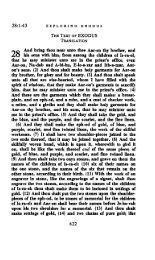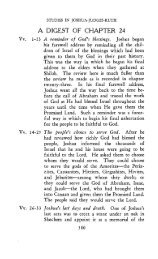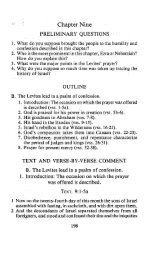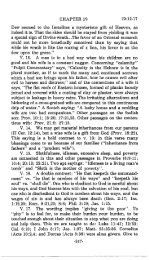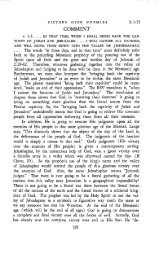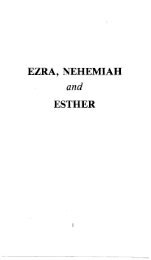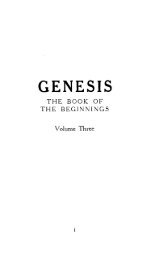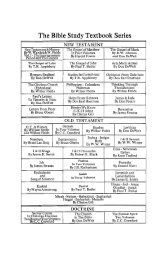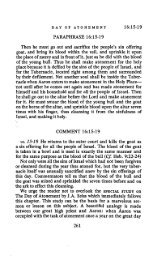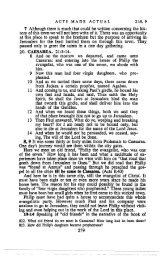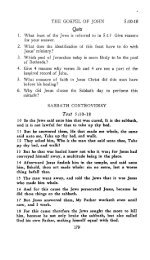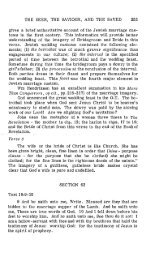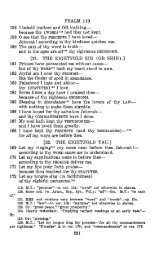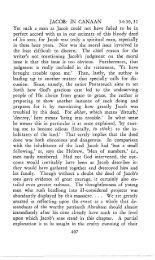Studies in the Psalms Vol 2 Part 2 - Only The Word
Studies in the Psalms Vol 2 Part 2 - Only The Word
Studies in the Psalms Vol 2 Part 2 - Only The Word
You also want an ePaper? Increase the reach of your titles
YUMPU automatically turns print PDFs into web optimized ePapers that Google loves.
STUDIES IN PSALMS<br />
RATHER THAN MESSIANIC, as a glance through <strong>the</strong>m Will at once<br />
shew. No Messiah, no Son of David, is once named <strong>in</strong> <strong>the</strong>m.<br />
At first this is startl<strong>in</strong>g: ultimately it seems less strange. For,<br />
let us consider: S<strong>in</strong>ce “No man can see God and live” (Exo.<br />
33:20), s<strong>in</strong>ce “No man hath seen God himself at any time”<br />
(John 1 :18), it follows that whenever men have been held to<br />
have seen him, it can only have been through a veil. It is<br />
well known that <strong>the</strong>re are <strong>in</strong>cidents and suggestions even <strong>in</strong> <strong>the</strong><br />
Old Testament look<strong>in</strong>g <strong>in</strong> this direction, particularly with regard<br />
to <strong>the</strong> Messenger <strong>in</strong> whom is <strong>the</strong> name Jehovah (Gen.<br />
16:lO-13, 19:24, Exo. 23:20, 21, 33:14, 15). <strong>The</strong>n, too, Christians,<br />
hold<strong>in</strong>g Jesus of Nazareth to have been <strong>the</strong> Messiah,<br />
consistently conceive of him as <strong>the</strong> veiled manifestation of Deity<br />
-veiled “<strong>in</strong> self-renunciation and self-xbasement” ; and <strong>the</strong>refore<br />
no man was compelled to see his glory; ,which glory, now, for<br />
<strong>the</strong> present, is “hid <strong>in</strong> God” (Col. 3:3) and ready at any time<br />
to burst forth as <strong>in</strong> <strong>the</strong>se <strong>The</strong>ocratic psalms.<br />
A third reflection naturally follows: That <strong>the</strong>se psalms, for<br />
<strong>the</strong>ir fulfilment, await THE MESSIAH’S SECOND ADVENT. <strong>The</strong><br />
psalms are highly poetic, and even dramatic, as all sober <strong>in</strong>terpreters<br />
admit. Still, it by no means follows that <strong>the</strong>y have<br />
no clear burden to deliver; and <strong>the</strong>refore <strong>the</strong> dictate of sanctified<br />
common sense would appear to be to say, Will <strong>the</strong> burden of<br />
<strong>the</strong>se psalms, when due allowance has been made for figures<br />
of speech, be well met when <strong>the</strong> Messiah returns, accord<strong>in</strong>g to<br />
<strong>the</strong> pla<strong>in</strong> sense of his own and his apostles’ say<strong>in</strong>gs about his<br />
Second Com<strong>in</strong>g?<br />
We may here streng<strong>the</strong>n <strong>the</strong>se reflections by quot<strong>in</strong>g <strong>the</strong><br />
weighty words of Delitzsch: “In addition to such psalms as<br />
behold <strong>in</strong> anticipation <strong>the</strong> Messianic future, whe<strong>the</strong>r it be prophetically<br />
or only typically, or typically and prophetically at<br />
once, as <strong>the</strong> world-movercom<strong>in</strong>g and world-bless<strong>in</strong>g k<strong>in</strong>gship of<br />
<strong>the</strong> Ano<strong>in</strong>ted of Jahve, <strong>the</strong>re are o<strong>the</strong>rs, <strong>in</strong> which <strong>the</strong> perfected<br />
<strong>the</strong>ocracy as such is seen beforehand, not as <strong>the</strong> parousia of a<br />
human k<strong>in</strong>g, but as <strong>the</strong> parousia of Jahve himself, as <strong>the</strong> k<strong>in</strong>gdom<br />
of God manifest <strong>in</strong> all its glory. <strong>The</strong>se <strong>the</strong>ocratic psalms<br />
form along with <strong>the</strong> Christocratic two series of prophecies,<br />
referr<strong>in</strong>g to <strong>the</strong> last time, which run parallel with one ano<strong>the</strong>r.<br />
<strong>The</strong> one has for its goal <strong>the</strong> Ano<strong>in</strong>ted of Jahve, who from out of<br />
Zion rules over all peoples; while <strong>the</strong> o<strong>the</strong>r has Jahve, seated<br />
above <strong>the</strong> cherubim, to whom <strong>the</strong> whole world pays homage.<br />
Although <strong>the</strong>se two series converge <strong>in</strong> <strong>the</strong> Old Testament, <strong>the</strong>y<br />
156



